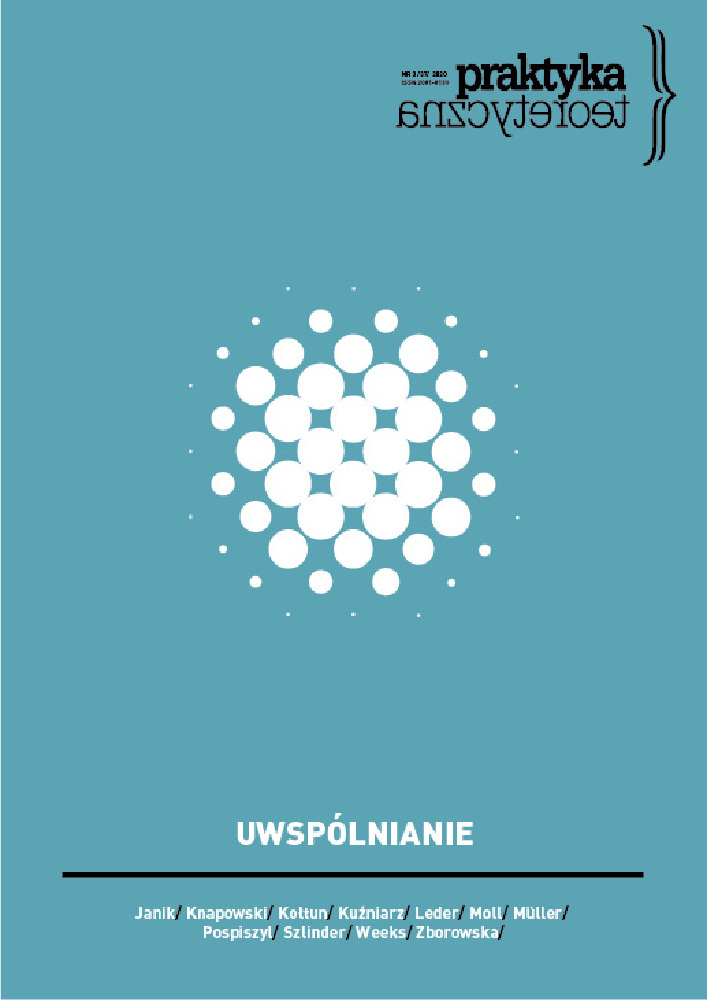Abstract
Walka o autonomię – Kathi Weeks i feministyczna polityka na rzecz dochodu podstawowego: Przedmowa do tłumaczenia.
References
Bednarek, Joanna. 2011. „Utopia? Tak, poproszę!” Praktyka Teoretyczna 4: 201–207.
De Wispelaere, Jurgen, i José A. Noguera. 2012. „On the Political Feasibility of Universal Basic Income: An Analytic Framework.” W Basic Income Guarantee and Politics: International Experiences and Perspectives on the Viability of Income Guarantee, red. Richard K. Caputo. Basingstoke – New York: Palgrave Macmillan.
Federici, Silvia. 1995. „Wages Against Housework.” W The Politics of Housework, red. Ellen Malos. Cheltenham: New Clarion Press.
Frase, Peter. 2018. Cztery przyszłości. Wizje świata po kapitalizmie. Tłum. Maciej Szlinder. Warszawa: Państwowe Wydawnictwo Naukowe.
Standing, Guy. 2014. Prekariat. Nowa niebezpieczna klasa. Tłum. Krzysztof Czarnecki, Paweł Kaczmarski i Mateusz Karolak. Warszawa: Państwowe Wydawnictwo Naukowe.
Standing, Guy. 2017. „Alternatywy dla dochodu podstawowego. Przegląd krytyczny.” Tłum. Tomasz Płomiński. Praktyka Teoretyczna 24(2): 15−38. https://doi.org/10.14746/prt.2017.2.1.
Szlinder, Maciej. 2018. Bezwarunkowy dochód podstawowy. Rewolucyjna reforma społeczeństwa XXI wieku. Warszawa: Państwowe Wydawnictwo Naukowe.
Weeks, Kathi. 2011. The Problem with Work: Feminism, Marxism, Antiwork Politics and Postwork Imaginaries. Durham: Duke University Press.
Weeks, Kathi. 2016. „A feminist case for Basic Income: An interview with Kathi Weeks.” Rozmawia K. Cruz, Critical Legal Thinking, 22 sierpnia, https://criticallegalthinking.com/2016/08/22/feminist-case--basic-income-interview-kathi-weeks/.
Weeks, Kathi. 2020. „Polityka feministyczna anty/postpracy a obrona dochodu podstawowego.” Praktyka Teoretyczna 37(3): 119–151. https://doi.org/10.14746/prt2020.3.6.
License
“Theoretical Practice” seeks to put into practice the idea of open access to knowledge and broadening the domain of the commons. It serves the development of science, thinking and critical reflection. The journal is published in open-access mode under the CC-BY-NC-SA 4.0 license (detail available here: http://creativecommons.org/licenses/by-nc-sa/4.0/). Articles published in the journal may be freely distributed, stored, printed and utilized for academic and teaching purposes without restrictions.
They should not be, however, used for any commercial purposes or be reconstructed into derivative creations. Access to the journal may not be limited or offered for a fee by any third party.
Prospective authors are obliged to fill in, sign and send back the publishing contract compliant with the CC licencing. [PL.pdf, PL.doc, EN.pdf,EN.doc].
According to this contract, authors grant the journal a non-exclusive right to publish their work under the creative commons license (CC-BY-NC-SA 4.0) without any financial obligation on both sides of the contract.
Before submission authors should make sure that derivative materials they use are not protected by copyright preventing their non-commercial publication. Authors are responsible for any respective copyright violations.
